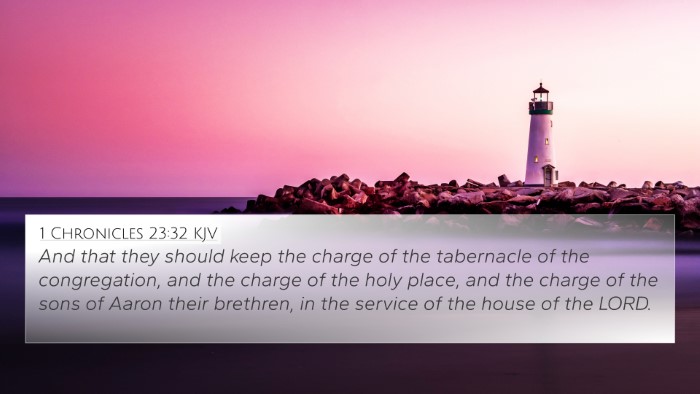Ezekiel 44:8 - Meaning and Interpretation
Ezekiel 44:8 states: "And ye have not kept the charge of mine holy things; but ye have set keepers of my charge in the temple for yourselves." This verse addresses the negligence of the priests regarding their sacred responsibilities, emphasizing the importance of faithfulness in ministry.
Summary of Insights
The interpretation of Ezekiel 44:8 revolves around several key themes:
- Negligence of Duties: The priests in Israel were responsible for maintaining the sanctity of the temple and the holiness of God's commandments. Their failure to do so highlights a lack of faithfulness.
- Authority and Accountability: The verse suggests that leaders in spiritual matters must be accountable for their actions, and they should prioritize God's commands over personal or selfish interests.
- Divine Expectations: God expects leaders to guide their flock righteously. The message is a reminder that true leadership in the church involves serving others and upholding sacred duties.
- Consequences of Failure: The negligence mentioned in this verse signals potential consequences—spiritual decay, loss of favor, and divine judgment.
- Importance of Holiness: The call to maintain holiness within the temple represents a broader call for believers to uphold God's standards in their lives.
Connections with Other Bible Verses
To understand Ezekiel 44:8 fully, one can explore various relevant cross-references and thematic connections across Scripture:
- Leviticus 10:1-3: This passage illustrates the seriousness of approaching God's holiness improperly and emphasizes obedience in priestly duties.
- Malachi 2:7-9: God's expectations of priests and their responsibility to teach His people are outlined, showcasing the vital role of accountability.
- Hebrews 5:1-3: This New Testament verse reflects the role of priests as those who can empathize with the people, linking to the call for leaders to be diligent and compassionate.
- 1 Peter 2:9: The priesthood of all believers signifies that every Christian is called to uphold holiness, further emphasizing the point of Ezekiel 44:8 regarding spiritual responsibility.
- James 3:1: This verse warns that not many should aspire to be teachers because of the greater judgment they will face—enhancing the theme of accountability for spiritual leaders.
- Matthew 23:23: Jesus' condemnation of the Pharisees for their neglect of justice and mercy ties back to the principle of faithful service in spiritual leadership.
- Numbers 18:1-7: God's instructions to the Levitical priests emphasize their responsibilities within the temple, connecting ancient practices with Ezekiel's admonishment.
- Revelation 1:6: The depiction of believers as a royal priesthood serves as a reminder of the ongoing importance of faithfulness in spiritual duties.
- John 10:12-13: The contrast between the good shepherd and the hired hand addresses the idea of true stewardship and commitment to the flock.
- Titus 1:7-9: Paul's letters to Titus underscore the importance of appointing qualified leaders who remain steadfast in their calling and doctrine.
Tools for Bible Cross-Referencing
To delve deeper into the meanings and connections surrounding Ezekiel 44:8, readers can utilize several tools:
- Bible Concordance: A useful resource for locating verses based on keywords.
- Bible Cross-Reference Guide: This can help find verses that echo similar themes or messages.
- Cross-Reference Bible Study: Engaging in thematic studies can unveil deeper insights into Scripture.
- How to Use Bible Cross-References: Learning the methods for effectively utilizing cross-references will enhance understanding.
- Bible Chain References: Following chains of related verses allows for a comprehensive view of biblical themes.
- Comprehensive Bible Cross-Reference Materials: Various study Bibles provide cross-referencing tools for deeper study.
- Inter-Biblical Dialogue: This concept encourages readers to explore connections between Old and New Testament writings.
Conclusion
The implications of Ezekiel 44:8 resonate throughout Scripture, reminding readers of the sacredness of their responsibilities before God. By cross-referencing related verses, believers can gain a more profound understanding of the importance of holiness and faithful service in their spiritual lives. This draws attention to the overall theme of accountability within the church, urging both leaders and followers to uphold God's commandments earnestly.













